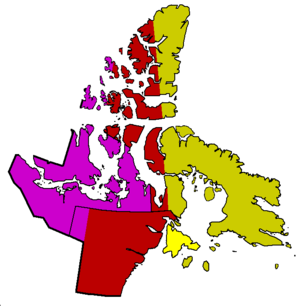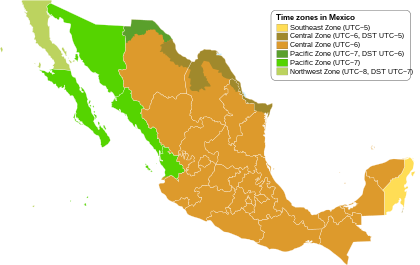UTC−06:00
| UTC−06:00 | |
|---|---|
| Time zone | |
 World map with the time zone highlighted | |
| UTC offset | |
| UTC | UTC−06:00 |
| Current time | |
| 00:10, 1 November 2024 UTC−06:00 [refresh] | |
| Central meridian | |
| 90 degrees W | |
| Date-time group | |
| S | |


| Standard | DST | ||
|---|---|---|---|
| GMT−05:00 | GMT−04:00 | Eastern Time | |
| GMT−05:00 (year round) | Eastern Time | ||
| GMT−06:00 | GMT−05:00 | Central Time | |
| GMT−07:00 | GMT−06:00 | Mountain Time | |

| Standard | DST | US time zone | |
|---|---|---|---|
| Red | UTC−06:00 | UTC−05:00 | Central Time |
| Yellow | UTC−05:00 | UTC−04:00 | Eastern Time |

| Mexican time zone | Standard | DST | U.S. equivalent | |
|---|---|---|---|---|
| Zona Sureste | UTC−05:00 | Eastern Standard Time | ||
| Zona Centro | UTC−06:00 | UTC−05:00 | Central Time | |
| UTC−06:00 | Central Standard Time | |||
| Zona Pacífico | UTC−07:00 | UTC−06:00 | Mountain Time | |
| UTC−07:00 | Mountain Standard Time | |||
| Zona Noroeste | UTC−08:00 | UTC−07:00 | Pacific Time | |
UTC−06:00 is an identifier for a time offset from UTC of −06:00. In North America, it is observed in the Central Time Zone during standard time, and in the Mountain Time Zone during the other eight months (see Daylight saving time). Several Latin American countries and a few other places use it year-round.
As standard time (Northern Hemisphere winter)
Principal cities: Mexico City, Chicago, Dallas, Houston, St. Louis, Minneapolis, Austin, Kansas City, San Antonio, Nashville, Milwaukee, Oklahoma City, Winnipeg
North America
CST is standard time in the 6th time zone west of Greenwich, reckoned at the 90th meridian; used in North America in some parts of Canada, Mexico and the United States.[1]
- Canada (Central Time Zone)
- Mexico
- All except Baja California, Baja California Sur, Chihuahua, Nayarit, Quintana Roo, Sinaloa and Sonora.[3]
- A small enclave of the UTC-6 time zone is followed in the municipality of Bahía de Banderas, Nayarit, due to its strong economic ties with the neighboring municipality of Puerto Vallarta, Jalisco. In most UNIX-like operating systems this area is represented as Americas/Bahia_Banderas.
- United States (Central Time Zone)
- Alabama
- Arkansas
- Florida
- The counties of Bay, Calhoun, Escambia, Holmes, Jackson, Okaloosa, Santa Rosa, Walton, and Washington, and northern Gulf county (panhandle)[4]
- Illinois
- Indiana[5]
- Iowa
- Kansas
- Entire state except westernmost counties
- Kentucky
- Louisiana
- Michigan[7]
- Minnesota
- Mississippi
- Missouri
- Nebraska
- Central and eastern Nebraska
- North Dakota
- Entire state except southwest
- Oklahoma
- Entire state except Kenton
- South Dakota
- Eastern half
- Tennessee
- Texas
- All except westernmost counties
- Wisconsin
As daylight saving time (Northern Hemisphere summer)
Principal cities: Denver, Billings, Boise, Salt Lake City, Albuquerque, El Paso, Edmonton, Calgary, Ciudad Juárez
North America
- Canada (Mountain Time Zone)[9]
- Mexico
- Baja California Sur, Chihuahua, Nayarit and Sinaloa states[3]
- United States (Mountain Time Zone)[4]
- Arizona - Navajo Nation only
- Colorado
- Idaho[12]
- South of Salmon River
- Kansas
- Montana
- Nebraska
- Nevada
- New Mexico
- North Dakota
- Oklahoma
- Oregon
- Malheur County (except a small strip in the south)
- South Dakota
- Texas
- Utah
- Wyoming
As standard time (year-round)
Principal cities: Guatemala City, Tegucigalpa, Managua, Belmopan, Belize City, San José, San Salvador
Central America
- Belize
- Costa Rica
- El Salvador
- Guatemala
- Honduras
- Nicaragua
- Called Central America Time Zone
North America
- Canada (Central Time Zone)
- Saskatchewan
- All province except Lloydminster
- Saskatchewan
Oceania
East Pacific
- Ecuador
As standard time (Southern Hemisphere winter)
Oceania
East Pacific
- Chile
See also
References
- ^ "WordNet Search – 3.1". wordnetweb.princeton.edu. Retrieved 9 July 2017.
- ^ "Ontario Time Zone – Ontario Current Local Time – Daylight Saving Time". TimeTemperature.com. Retrieved 1 February 2015.
- ^ a b "Hora Oficial en los Estados Unidos Mexicanos" (in Spanish). Centro Nacional de Metrologîa. 11 November 2010. Retrieved 14 July 2012.
- ^ a b c d "Time Zones of the United States". Statoids. Retrieved 25 August 2012.
- ^ "Time zone map (spring)" (PDF). Indiana State. 13 March 2011. Retrieved 14 July 2012.
- ^ "Kentucky County Map". Kentucky Map Collection. Geology.com. Retrieved 6 October 2012.
- ^ "Michigan Time Zone – Michigan Current Local Time – Daylight Saving Time". TimeTemperature.com. Retrieved 25 August 2012.
- ^ "Tennessee County Map". Tennessee Map Collection. Geology.com. Retrieved 6 October 2012.
- ^ "North American time zones: MST – Mountain Standard Time". Time and Date. Retrieved 28 September 2012.
- ^ New Time Zone in Fort Nelson, timeanddate.com, September 21, 2015.
- ^ "Canada Time Zone Map". WorldTimeZone.com. Retrieved 9 November 2012.
- ^ "15 USC § 264 – Part of Idaho in Fourth Zone". Legal Information Institute. Cornell University Law School. Retrieved 15 July 2012.
